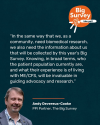UK Action for ME Big Survey 2025
Quoted from the Action for ME website:
__________________
Our 2025 Big Survey is now open
The survey will close at 11.59pm on Tuesday 27 January 2026. Please make sure that you have finished the survey and submitted your responses before this date.
We have two separate surveys: one for people aged 18 (Adults) and over and one for people aged 17 and under (Young people).
Thank you for taking the time and energy to support this vital research.
Adult's survey
Young people's survey
What is the Big Survey?
Every 5 years, we develop our Big Survey. It enables us to gather large amounts of data which can then be analysed and used to support our wider work and illustrate the impact of ME.
Our last Big Survey was completed by over 4,000 children, young people, and adults, in 2019.
The 2025 Big Survey is a collaboration between Action for ME and the Discovery Research Platform for Medical Humanities at the Institute for Medical Humanities (IMH), Durham University. Postdoctoral researcher, Dr Katherine Cheston, is working with us to help support the survey's development, data collection, and subsequent analysis.
You can find out more information about the Discovery Research Platform for Medical Humanities at the IMH, and Dr Cheston's involvement further down on this page.
Who can complete the Big Survey?
The Big Survey is open to people living in the UK with ME, whether or not they have a diagnosis.
It is also open to people living in the UK with long Covid and who experience ME symptoms, even if they don't have a diagnosis.
If you are unable to complete the survey yourself, a carer is welcome to fill it out on your behalf.
What will you use this data for?
The views and experiences of people affected by ME crucial to our work and are regularly used to support our awareness raising and influencing policy, service development, and research.
However, it is also essential that we keep this data up-to-date to account any recent research developments, changes in service provision, and policy changes, and how they impact the lives of people with by ME.
Responses will be anonymised to be used by Action for ME, and our research collaborators, in their work. They will also be shared with Dr Audrey Ryback, University of Edinburgh, who will use the data to study the age of ME onset, triggers, and heritability.
For more information, please visit the FAQs section below.
_____________
End of quote. More at link.
Quoted from the Action for ME website:
__________________
Our 2025 Big Survey is now open
The survey will close at 11.59pm on Tuesday 27 January 2026. Please make sure that you have finished the survey and submitted your responses before this date.
We have two separate surveys: one for people aged 18 (Adults) and over and one for people aged 17 and under (Young people).
Thank you for taking the time and energy to support this vital research.
Adult's survey
Young people's survey
What is the Big Survey?
Every 5 years, we develop our Big Survey. It enables us to gather large amounts of data which can then be analysed and used to support our wider work and illustrate the impact of ME.
Our last Big Survey was completed by over 4,000 children, young people, and adults, in 2019.
The 2025 Big Survey is a collaboration between Action for ME and the Discovery Research Platform for Medical Humanities at the Institute for Medical Humanities (IMH), Durham University. Postdoctoral researcher, Dr Katherine Cheston, is working with us to help support the survey's development, data collection, and subsequent analysis.
You can find out more information about the Discovery Research Platform for Medical Humanities at the IMH, and Dr Cheston's involvement further down on this page.
Who can complete the Big Survey?
The Big Survey is open to people living in the UK with ME, whether or not they have a diagnosis.
It is also open to people living in the UK with long Covid and who experience ME symptoms, even if they don't have a diagnosis.
If you are unable to complete the survey yourself, a carer is welcome to fill it out on your behalf.
What will you use this data for?
The views and experiences of people affected by ME crucial to our work and are regularly used to support our awareness raising and influencing policy, service development, and research.
However, it is also essential that we keep this data up-to-date to account any recent research developments, changes in service provision, and policy changes, and how they impact the lives of people with by ME.
Responses will be anonymised to be used by Action for ME, and our research collaborators, in their work. They will also be shared with Dr Audrey Ryback, University of Edinburgh, who will use the data to study the age of ME onset, triggers, and heritability.
For more information, please visit the FAQs section below.
_____________
End of quote. More at link.
Last edited:


